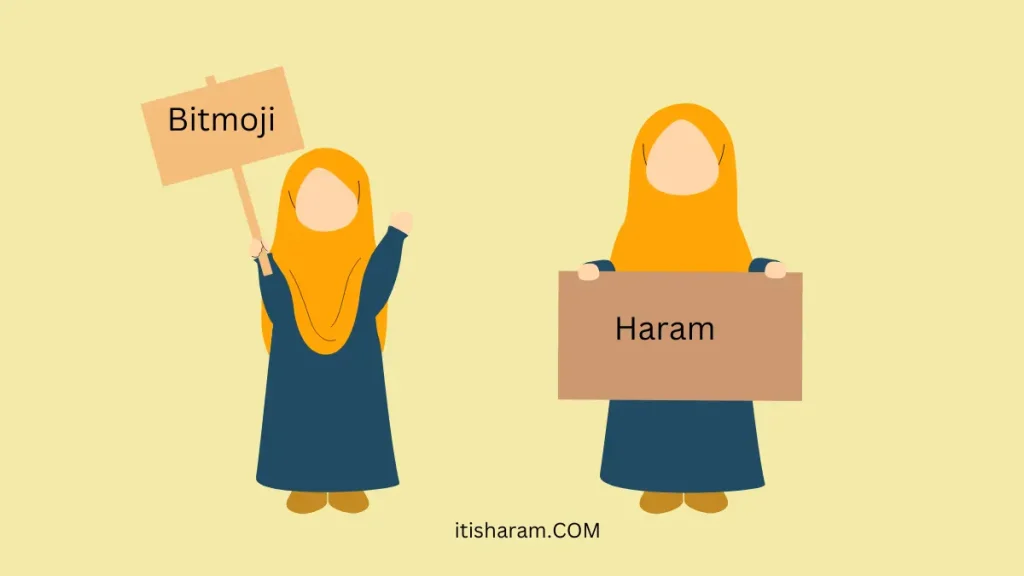Bitmoji Haram: Bitmoji has gained much popularity worldwide in the last few years. Social media users from all over the world have used Bitmoji as their image. This touch has come to Muslim society. Many Muslims use Bitmoji as their avatar.
But the question remains, what is Bitmoji Haram? You can read the complete post to know this answer. Hope you get your answer.
Understanding Bitmoji: What it is and How it Works
Bitmoji is a personal avatar you can create and use in various applications, such as Snapchat, Facebook, and WhatsApp.
It allows you to customize your appearance by choosing your hairstyle, clothes, and facial features to create an animated version of yourself. The avatar can be customized to match the user’s appearance, clothing, and accessories,
We are making it a fun and unique way to express oneself on social media platforms, messaging apps, and other digital platforms.
Difference Between Bitmoji and Emoji
If you’re an avid user of digital communication, you’ve likely come across both Bitmoji and emojis.
While they both serve the purpose of expressing emotions and ideas, they differ in some significant ways.
Bitmoji is a personalizable avatar that you create to represent yourself. You can choose your avatar’s features,
such as hairstyle, clothing, and accessories, to create a cartoon version of yourself.
Bitmoji also offers a vast library of pre-made images, including various facial expressions and poses, which you can use to express yourself in conversations.
On the other hand, emojis are pre-made images that depict a range of emotions, objects, and concepts.
They are standardized and recognized across different platforms and devices, making them a universal language for digital communication.
One significant difference between Bitmoji and emojis is the level of personalization.
With Bitmoji, you can create an avatar that looks like you, adding individuality and personal touch to your conversations.
With emojis, while they do express emotions, they lack the personal touch and individuality that Bitmoji offers.
Another difference is the range of emotions and expressions that they convey.
While emojis offer many emotions and objects, Bitmoji provides a more nuanced and personalized expression of feelings and actions.
Ultimately, the choice between Bitmoji and emojis depends on personal preference and the conversation context.
Bitmoji offers a fun and creative way to express oneself in casual conversations with friends and family.
In contrast, emojis are a more efficient way to communicate with others, especially in formal or professional settings.
Is Bitmoji Haram?
Yes, Bitmoji is Haram. This is the opinion of most Muslim scholars. They compare Bitmoji to paintings and sculptures.

The Qur’an and Hadith prohibit the painting of any animal. Therefore, Muslim scholars have said that drawing animal pictures in Haram since ancient times.
Drawing pictures of living animals is forbidden by consensus. Some scholars say it is not Haram to store images of live animals on devices.
However, drawing pictures of an inanimate nature is permissible in Islam. After understanding this concept of Islamic images,
we can say that Bitmoji is neither a nature nor an animal image captured on a device.
So Bitmoji is Haram. Because Bitmoji is an image of the human body, it is forbidden to draw pictures of it.
Is Bitmoji Haram in Hadith?
Yes, the hadith has declared Bitmoji haram. We Muslims know that there was no technology in ancient Arabia like today. So the word Bitmoji is not directly in the hadith. But some phrases in the hadith declare all human forms of Haram in general.
They were narrated by Qatadah (RA). He said I was with Ibn Abbas (RA). And people were asking him various things. But he was not referring to the Prophet’s (hadith) in reply.
Finally, he was asked about the picture, and he said: I heard Muhammad, may God bless him and grant him peace, say that whoever makes a picture of an animal in this world, he will be strictly ordered on the Day of Resurrection to sacrifice his life in that picture. But he cannot give life.’ (Sahih Bukhari, Hadith: 5963)
حَدَّثَنَا الْحُمَيْدِيُّ، حَدَّثَنَا سُفْيَانُ، حَدَّثَنَا الأَعْمَشُ، عَنْ مُسْلِمٍ، قَالَ كُنَّا مَعَ مَسْرُوقٍ فِي دَارِ يَسَارِ بْنِ نُمَيْرٍ، فَرَأَى فِي صُفَّتِهِ تَمَاثِيلَ فَقَالَ سَمِعْتُ عَبْدَ اللَّهِ قَالَ سَمِعْتُ النَّبِيَّ صلى الله عليه وسلم يَقُولُ “ إِنَّ أَشَدَّ النَّاسِ عَذَابًا عِنْدَ اللَّهِ يَوْمَ الْقِيَامَةِ الْمُصَوِّرُونَ ”
He was narrated by a Muslim (RA). He said We were (once) with Masrook in the house of Yasar ibn Numair. Masrook saw some idols in the courtyard of Yasir’s house and said: I heard from ‘Abdullah ibn Mas’ud (may Allah be pleased with him) and he heard the Prophet, may God bless him and grant him peace, say that the severest punishment among people (on the Day of Resurrection) will be those who make idols. .
Why Do People Believe Bitmoji is Haram?
Some people believe that using Bitmoji is Haram because it involves creating an image of oneself, which Islam forbids.
In Islam, it’s believed that creating images of living beings, including humans and animals, is a sin.
Others believe that Bitmoji is Haram because it promotes self-idolization and narcissism.
They argue that creating a personal avatar and using it to represent oneself on social media platforms is a form of self-promotion, which Islam frowns upon.
The Debate over Bitmoji in Islam: Different Perspectives and Interpretations
While some Muslims see Bitmoji as a harmless and enjoyable way to express themselves, others may have concerns about its permissibility in Islam.
Some scholars argue that creating a cartoon avatar of oneself is akin to creating an image, which is discouraged in Islam.
Others argue that using Bitmoji can lead to self-idolization and narcissism, which goes against the principles of humility and modesty in Islam.
Weighing the Pros and Cons of Using Bitmoji as a Muslim
For those who are considering using Bitmoji, it’s essential to weigh the potential benefits and drawbacks.
On the one hand, Bitmoji can be a fun and creative way to express oneself and connect with others on digital platforms.
On the other hand, it may negatively affect one’s self-esteem and promote selfish behaviour.
Ultimately, the decision to use Bitmoji as a Muslim is a personal one that should be made based on one’s beliefs and values.
Using Bitmoji Responsibly: Tips and Guidelines to Follow
For those who decide to use Bitmoji, it’s essential to do so responsibly and respectfully.
This means avoiding using Bitmoji in a way that promotes self-idolization or disrespect towards others.
Instead, it can be a fun and lighthearted way to express oneself and connect with others.
Seeking Guidance from Islamic Scholars and Imams on the Permissibility of Bitmoji
If you’re unsure whether using Bitmoji is permissible in Islam, it’s always a good idea to seek guidance from your local Islamic scholar or imam.
They can give you a more informed and nuanced understanding of the issue based on your circumstances and beliefs.
The Importance of Adaptability and Flexibility in Islam: Navigating New Technologies and Innovations
As technology and innovation evolve, Muslims must approach these changes with an open mind and a willingness to adapt.
While it’s essential to adhere to the principles and values of Islam, it’s also important to recognize the need for flexibility and adaptability in a changing world.
By striking a balance between tradition and innovation, we can ensure that we live our lives by faith while embracing the benefits and opportunities of new technologies.
FAQs about Bitmoji Haram in Islam
Q: Is using Bitmoji Haram in Islam?
A: The answer to this question depends on personal interpretation and understanding of Islamic teachings. Some Muslims believe that it is Haram, while others do not.
Q: Why do some Muslims consider Bitmoji haram?
A: Some Muslims believe that creating a digital avatar of oneself goes against the Islamic prohibition on images and representation.
Additionally, they believe it can lead to vanity and self-obsession, which Islam considers Haram.
Q: Can Muslims use Bitmoji if they are not creating a representation of themselves?
A: Some Muslims believe that using Bitmoji is not Haram if it does not involve creating a representation of oneself.
summary
In conclusion, whether Bitmoji is Haram is complex and has no clear answer.
Different scholars and schools of thought have different opinions, and it’s up to individual Muslims to decide what’s right for them.
If you’re concerned about using Bitmoji, it’s essential to consult with your local Islamic scholar or imam for guidance.
They can give you a better understanding of the Islamic stance on creating images of living beings and whether or not using Bitmoji is permissible in Islam.







